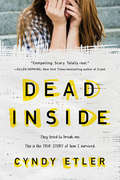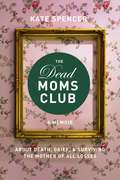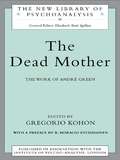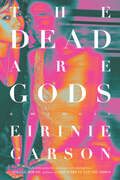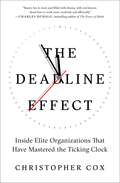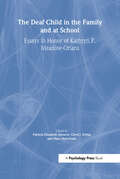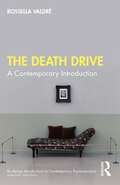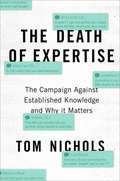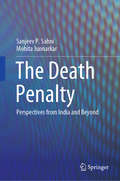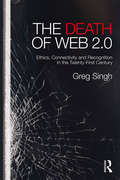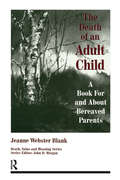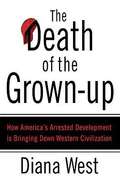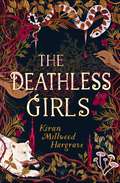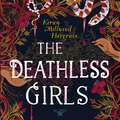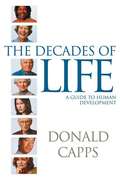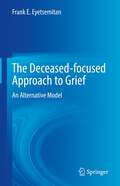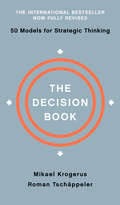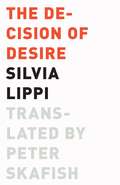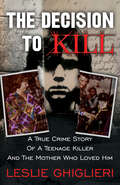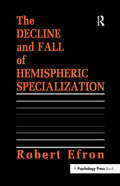- Table View
- List View
The Dead House: A Companion Novella
by Dawn KurtagichWelcome to the Dead House. Three students: dead.Carly Johnson: vanished without a trace.Two decades have passed since an inferno swept through Elmbridge High, claiming the lives of three teenagers and causing one student, Carly Johnson, to disappear. The main suspect: Kaitlyn, "the girl of nowhere."Kaitlyn's diary, discovered in the ruins of Elmbridge High, reveals the thoughts of a disturbed mind. Its charred pages tell a sinister version of events that took place that tragic night, and the girl of nowhere is caught in the center of it all. But many claim Kaitlyn doesn't exist, and in a way, she doesn't - because she is the alter ego of Carly Johnson.Carly gets the day. Kaitlyn has the night. It's during the night that a mystery surrounding the Dead House unravels and a dark, twisted magic ruins the lives of each student that dares touch it. Debut author Dawn Kurtagich masterfully weaves together a thrilling and terrifying story using psychiatric reports, witness testimonials, video footage, and the discovered diary - and as the mystery grows, the horrifying truth about what happened that night unfolds.
The Dead House: A Companion Novella
by Dawn KurtagichTwenty-five years ago, Elmbridge High School burned down. The blaze killed three and injured twenty, and one pupil, Carly Johnson, disappeared. For two decades, little was revealed about what became known as the Johnson Incident.Until now. A diary has been found in the ruins of the school. In this diary, Kaitlyn Johnson, Carly's twin, tells of the strange and disturbing sequence of events leading to the incident. But Kaitlyn doesn't exist. She never has.Chilling, creepy and compelling, THE DEAD HOUSE is one of those very special books that finds all the dark places in your imagination, and haunts you long after you've finished reading.
The Dead Inside: A True Story
by Cyndy EtlerFor readers of Girl Interrupted and Tweak, Cyndy Etler's gripping memoir gives readers a glimpse into the harrowing reality of her sixteen months in the notorious "tough love" program the ACLU called "a concentration camp for throwaway kids."I never was a badass. Or a slut, a junkie, a stoner, like they told me I was. I was just a kid looking for something good, something that felt like love. I was a wannabe in a Levi's jean jacket. Anybody could see that. Except my mother. And the professionals at Straight.From the outside, Straight Inc. was a drug rehab. But on the inside it was...well, it was something else.All Cyndy wanted was to be loved and accepted. By age fourteen, she had escaped from her violent home, only to be reported as a runaway and sent to a "drug rehabilitation" facility that changed her world.To the public, Straight Inc. was a place of recovery. But behind closed doors, the program used bizarre and intimidating methods to "treat" its patients. In her raw and fearless memoir, Cyndy Etler recounts her sixteen months in the living nightmare that Straight Inc. considered "healing."
The Dead Moms Club: A Memoir about Death, Grief, and Surviving the Mother of All Losses
by Kate SpencerKate Spencer lost her mom to cancer when she was 27. In The Dead Moms Club, she walks readers through her experience of stumbling through grief and loss, and helps them to get through it, too. This isn't a weepy, sentimental story, but rather a frank, up-front look at what it means to go through gruesome grief and come out on the other side.An empathetic read, The Dead Moms Club covers how losing her mother changed nearly everything in her life: both men and women readers who have lost parents or experienced grief of this magnitude will be comforted and consoled. Spencer even concludes each chapter with a cheeky but useful tip for readers (like the "It's None of Your Business Card" to copy and hand out to nosy strangers asking about your passed loved one).
The Dead Mother: The Work of Andre Green (The New Library of Psychoanalysis)
by Gregorio KohonThe Dead Mother brings together original essays in honour of André Green. Written by distinguished psychoanalysts, the collection develops the theme of his most famous paper of the same title, and describes the value of the dead mother to other areas of clinical interest: psychic reality, borderline phenomena, passions and identification. The concept of the 'dead mother' describes a clinical phenomenon, sometimes difficult to identify, but always present in a substantial number of patients. It describes a process by which the image of a living and loving mother is transformed into a distant figure; a toneless, practically inanimate, dead parent. In reality, the mother remains alive, but she has psychically 'died' for the child. This produces a depression in the child, who carries these feelings within him into adult life, as the experience of the loss of the mother's love is followed by the loss of meaning in life. Nothing makes sense any more for the child, but life seems to continue under the appearance of normality. The Dead Mother is a valuable contribution to literature on psychoanalytic and psychotheraputic approaches to grief, loss and depression.
The Dead are Gods
by Eirinie CarsonAn Oprah Daily Spring 2023 Reading List Pick "...striking a deeply resonant chord for anyone who has experienced the obsessive self-searching that often accompanies a sudden loss." -- Oprah Daily "Carson captures the pervasive nature of grief with a poetic voice that beautifully resonates." -- Shondaland "This is raw, heartfelt, beautiful, soul-opening and real." -- Zibby Owens for Good Morning America From an exciting new literary voice: a memoir that explores grief, Blackness, and recovery after the death of a dear friend. After an unexpected phone call on an early morning in 2018, writer and model Eirinie Carson learned of her best friend Larissa&’s death. In the wake of her shock, Eirinie attempts to make sense of the events leading up to Larissa&’s death and uncovers startling secrets about her life in the process. THE DEAD ARE GODS is Eirinie&’s striking, intimate, and profoundly moving depiction of life after a sudden loss. Amid navigating moments of intense grief, Eirinie is overwhelmed by her love for Larissa. She finds power in pulling moments of joy from the depths of her emotion. Eirinie&’s portrayal of what love feels like after death bursts from the page alongside a timely, honest, and personal exploration of Black love and Black life. Perhaps, Eirinie proposes, &“The only way out is through.&”
The Deadline Effect: How to Work Like It's the Last Minute—Before the Last Minute
by Christopher CoxIn the tradition of Charles Duhigg&’s The Power of Habit, Christopher Cox&’s The Deadline Effect is a wise and counterintuitive book that explores the power of deadlines as uniquely effective tools of motivation and empowerment.Perfectionists and procrastinators alike agree—it&’s natural to dread a deadline. Whether your goal is to complete a masterpiece or just check off an overwhelming to-do list, the ticking clock signals despair. Christopher Cox knows the panic of the looming deadline all too well—as a magazine editor, he has spent years overseeing writers and journalists who couldn&’t meet a deadline to save their lives. After putting in a few too many late nights in the newsroom, he became determined to learn the secret of managing deadlines. He set off to observe nine different organizations as they approached a high-pressure deadline. Along the way, Cox made an ever greater discovery: these experts didn&’t just meet their big deadlines—they became more focused, productive, and creative in the process. In The Deadline Effect, Cox shares the strategies these teams used to guarantee success while staying on schedule: a restaurant opening for the first time, a ski resort covering an entire mountain in snow, a farm growing enough lilies in time for Easter, and more. Cox explains how readers can understand the psychological underpinnings of expectations and time, the dynamics of teams and customers, and techniques for using deadlines to make better, more assured decisions.
The Deaf Child in the Family and at School: Essays in Honor of Kathryn P. Meadow-Orlans
by Patricia Elizab Spencer Carol J. Erting Marc MarscharkThis book presents chapters by many eminent researchers and interventionists, all of whom address the development of deaf and hard-of-hearing children in the context of family and school. A variety of disciplines and perspectives are provided in order to capture the complexity of factors affecting development of these children in their diverse environments. Consistent with current theory and educational practice, the book focuses most strongly on the interaction of family and child strengths and needs and the role of educational and other interventionists in supporting family and child growth. This work, and the authors represented in it, have been influenced by the seminal work of Kathryn P. Meadow-Orlans, whose work continues to apply a multidisciplinary, developmental approach to understanding the development of deaf children. The book differs from other collections in the degree to which the chapters share ecological and developmental theoretical bases. A synthesis of information is provided in section introductions and in an afterword provided by Dr. Meadow-Orlans. The book reflects emerging research practice in the field by representing both qualitative and quantitative approaches. In addition, the book is notable for the contributions of deaf as well as hearing authors and for chapters in which research participants speak for themselves--providing first-person accounts of experiences and feelings of deaf children and their parents. Some chapters in the book may surprise readers in that they present a more positive view of family and child functioning than has historically been the case in this field. This is consistent with emerging data from deaf and hard of hearing children who have benefitted from early identification and intervention. In addition, it represents an emerging recognition of strengths shown by the children and by their deaf and hearing parents. The book moves from consideration of child and family to a focus on the role and effects of school environments on development. Issues of culture and expectations pervade the chapters in this section of the book, which includes chapters addressing effects of school placement options, positive effects of learning about deaf culture and history, effects of changing educational practice in developing nations, and the need for increased knowledge about ways to meet individual needs of the diverse group of deaf and hard of hearing students. Thus, the book gives the reader a coherent view of current knowledge and issues in research and intervention for deaf and hard of hearing children and their families. Because the focus is on child and family instead of a specific discipline, the book can serve as a helpful supplemental text for advanced undergraduate and graduate courses in a variety of disciplines, including education, psychology, sociology, and language studies with an emphasis on deaf and hard of hearing children.
The Death Drive: A Contemporary Introduction (Routledge Introductions to Contemporary Psychoanalysis)
by Rossella ValdrèThis comprehensive yet accessible book analyses the clinical and historical experiences that led to the radical, complex and fundamental psychoanalytic concept of the death drive.In The Death Drive: A Contemporary Introduction, Rossella Valdrè traces the path that led Sigmund Freud to theorise this key concept in his essay, Beyond the Pleasure Principle. She considers its roots in Freud’s experiences of war trauma and his assessment of the human compulsion to repeat, as well as its consequences on his later theoretical and clinical work. Short vignettes from the clinician’s room and examples from books and films introduce the reader to the birth and development of the concept, its biological and philosophical roots and its many clinical implications. Valdrè also reviews its varied reception among post-Freudians, and examines the controversies and questions that the death drive commonly engenders within the psychoanalytic community. She concludes by considering the death drive through the medium of art, its relationship with sublimation and the confirmation neuroscience is beginning to provide.Written in a style that is at once accessible and precise, this book is an invaluable tool to students and psychoanalysts in training approaching the theory for the first time, as well as practising analysts, postgraduate students and scholars familiar with the concept and looking to explore it further.
The Death Of Expertise
by Tom Nichols9780394577456Technology and increasing levels of education have exposed people to more information than ever before.9780394577456 These societal gains, however, have also helped fuel a surge in narcissistic and misguided intellectual egalitarianism that has crippled informed debates on any number of issues.9780394577456 Today, everyone knows everything: with only a quick trip through WebMD or Wikipedia, average citizens believe themselves to be on an equal intellectual footing with doctors and diplomats.9780394577456 All voices, even the most ridiculous, demand to be taken with equal seriousness, and any claim to the contrary is dismissed as undemocratic elitism.9780394577456 Tom Nichols' The Death of Expertise shows how this rejection of experts has occurred: the openness of the internet, the emergence of a customer satisfaction model in higher education, and the transformation of the news industry into a 24-hour entertainment machine, among other reasons. 9780394577456Paradoxically, the increasingly democratic dissemination of information, rather than producing an educated public, has instead created an army of ill-informed and angry citizens who denounce intellectual achievement. 9780394577456When ordinary citizens believe that no one knows more than anyone else, democratic institutions themselves are in danger of falling either to populism or to technocracy or, in the worst case, a combination of both.9780394577456 An update to the 2017breakout hit, the paperback edition of The Death of Expertise provides a new foreword to cover the alarming exacerbation of these trends in the aftermath of Donald Trump's election.9780394577456 Judging from events on the ground since it first published, The Death of Expertise issues a warning about the stability and survival of modern democracy in the Information Age that is even more important today.
The Death Penalty: Perspectives from India and Beyond
by Mohita Junnarkar Sanjeev P. SahniThis book offers a broad overview of public attitudes to the death penalty in India. It examines in detail the progress made by international organizations worldwide in their efforts to abolish the death penalty and provides statistics from various countries that have already abolished it. The book focuses on four main aspects: the excessive cost and poor use of funds; wrongful executions of innocent people; the death penalty’s failure as an efficient deterrent; and the alternative sentence of life imprisonment without parole. In closing, the book analyses the current debates on capital punishment around the globe and in the Indian context. Based on public opinion surveys, the book is essential reading for all those interested in India, its government, criminal justice system, and policies on the death penalty and human rights.
The Death of Desire: An Existential Study in Sanity and Madness
by M. Guy ThompsonA stunning exploration of the relation between desire and psychopathology, The Death of Desire is a unique synthesis of the work of Laing, Freud, Nietzsche, and Heidegger that renders their often difficult concepts brilliantly accessible to and usable by psychotherapists of all persuasions. In bridging a critical gap between phenomenology and psychoanalysis, M. Guy Thompson, one of the leading existential psychoanalysts of our time, firmly re-situates the unconscious – what Freud called "the lost continent of repressed desires" – in phenomenology. In so doing, he provides us with the richest, most compelling phenomenological treatment of the unconscious to date and also makes Freud’s theory of the unconscious newly comprehensible. In this revised and updated second edition to the original published in 1985, M. Guy Thompson takes us inside his soul-searching seven-year apprenticeship with radical psychiatrist R. D. Laing and his cohorts as it unfolded in counterculture London of the 1970s. This rite de passage culminates with a four-year sojourn inside one of Laing’s post-Kingsley Hall asylums, where Laing’s unorthodox conception of treatment dispenses with conventional boundaries between "doctor" and "patient." In this unprecedented exploration, Thompson reveals the secret to Laing’s astonishing alternative to the conventional psychiatric and psychoanalytic treatment schemes. Movingly written and deeply personal, Thompson shows why the very concept of "mental illness" is a misnomer and why sanity and madness should be understood instead as inherently puzzling stratagems that we devise in order to protect ourselves from intolerable mental anguish. The Death of Desire offers a provocative and challenging reappraisal of depth psychotherapy from an existential perspective that will be of interest to psychoanalysts, psychotherapists, philosophers, social scientists, and students of the human condition.
The Death of Web 2.0: Ethics, Connectivity and Recognition in the Twenty-First Century
by Greg SinghWith all our contemporary connectivity, are we really connected? What does the nature of connectivity tell us about interpersonal and community relationships? What ethical concerns are raised through an always-on culture? Communication in today’s world is characterised by a condition of persistent, semi-permanent connectivity, which seems to bring us closer together, but which can also be profoundly alienating. The Death of Web 2.0 takes a retrospective look at a moment in recent media history that has had, and will continue to have, a lasting impact upon the predominant attitude towards cultures of connectivity. Greg Singh draws from a range of approaches, intellectual traditions and scholarly disciplines to engage key questions underpinning the contemporary communications media ecosystem. Bringing together influences from communitarian ethics, recognition theory and relational and depth psychology, Singh synthesises key approaches to produce a critical inquiry that projects the tensions at the heart of connectivity as a principle of Web 2.0. He argues that Web 2.0 is a cultural moment that is truly over, and that what is popularly described as 'Web 2.0' is an altogether different set of principles and practices. The Death of Web 2.0 recognises the consequences of our 'always-on' culture, where judgments are made quickly and where impacts can be far-reaching, affecting our relationships, wellbeing, mental health and the health of our communities, and it concludes by asking what an ethics of connectivity would look like. This unique interdisciplinary work will be essential reading for academics and students of Jungian and post-Jungian studies, media and cultural studies and psychosocial studies as well as anyone interested in the social implications of new media.
The Death of an Adult Child: A Book for and About Bereaved Parents (Death, Value and Meaning Series)
by Jeanne Webster BlankThis book was written to be a comfort and guide for bereaved parents whose adult child has died; to show by sharing our experiences that we are not alone in our responses to our child's death; that we are not weak, defective in character or otherwise inadequate because of the way we grieve; to spell out ways in which some of us have increased our understanding of our condition, found solace, dispelled guilt and anger, overcome depression, come to terms with survivors, and memorialized our deceased children. Questionnaires were sent to more than sixty bereaved parents of adult children who died and many anonymous examples from these questionnaires are used throughout the book.
The Death of the Grown-Up: How America's Arrested Development is Bringing Down Western Civilization
by Diana West"WHERE HAVE ALL THE GROWN-UPS GONE?" That is the provocative question Washington Times syndicated columnist Diana West asks as she looks at America today. Sadly, here's what she finds: It's difficult to tell the grown-ups from the children in a landscape littered with Baby Britneys, Moms Who Mosh, and Dads too "young" to call themselves "mister. " Surveying this sorry scene, West makes a much larger statement about our place in the world: "No wonder we can't stop Islamic terrorism. We haven't put away our toys!" As far as West is concerned, grown-ups are extinct. The disease that killed them emerged in the fifties, was incubated in the sixties, and became an epidemic in the seventies, leaving behind a nation of eternal adolescents who can't say "no," a politically correct population that doesn't know right from wrong. The result of such indecisiveness is, ultimately, the end of Western civilization as we know it. This is because the inability to take on the grown-up role of gatekeeper influences more than whether a sixteen-year-old should attend a Marilyn Manson concert. It also fosters the dithering cultural relativism that arose from the "culture wars" in the eighties and which now undermines our efforts in the "real" culture war of the 21st century--the war on terror. With insightful wit, Diana West takes readers on an odyssey through culture and politics, from the rise of rock 'n' roll to the rise of multiculturalism, from the loss of identity to the discovery of "diversity," from the emasculation of the heroic ideal to the "PC"-ing of "Mary Poppins," all the while building a compelling case against the childishness that is subverting the struggle against jihadist Islam in a mixed-up, post-9/11 world. With a new foreword for the paperback edition, "The Death of the Grown-up,"is a bracing read from one of the most original voices on the American cultural scene.
The Deathless Girls
by Kiran Millwood HargraveGothic, intoxicating, feminist, darkly provoking and deeply romantic - this is the breathtakingly imagined untold story of the brides of Dracula, by bestselling author Kiran Millwood Hargrave in her much-anticipated YA debut.They say the thirst of blood is like a madness - they must sate it. Even with their own kin.On the eve of her divining, the day she'll discover her fate, seventeen-year-old Lil and her twin sister Kizzy are captured and enslaved by the cruel Boyar Valcar, taken far away from their beloved traveller community. Forced to work in the harsh and unwelcoming castle kitchens, Lil is comforted when she meets Mira, a fellow slave who she feels drawn to in a way she doesn't understand. But she also learns about the Dragon, a mysterious and terrifying figure of myth and legend who takes girls as gifts. They may not have had their divining day, but the girls will still discover their fate...
The Deathless Girls
by Kiran Millwood HargraveGothic, intoxicating, feminist, darkly provoking and deeply romantic - this is the breathtakingly imagined untold story of the brides of Dracula, by bestselling author Kiran Millwood Hargrave in her much-anticipated YA debut.They say the thirst of blood is like a madness - they must sate it. Even with their own kin.On the eve of her divining, the day she'll discover her fate, seventeen-year-old Lil and her twin sister Kizzy are captured and enslaved by the cruel Boyar Valcar, taken far away from their beloved traveller community. Forced to work in the harsh and unwelcoming castle kitchens, Lil is comforted when she meets Mira, a fellow slave who she feels drawn to in a way she doesn't understand. But she also learns about the Dragon, a mysterious and terrifying figure of myth and legend who takes girls as gifts. They may not have had their divining day, but the girls will still discover their fate...
The Deathless Girls
by Kiran Millwood HargraveGothic, intoxicating, feminist, darkly provoking and deeply romantic - this is the breathtakingly imagined untold story of the brides of Dracula, by bestselling author Kiran Millwood Hargrave in her much-anticipated YA debut.They say the thirst of blood is like a madness - they must sate it. Even with their own kin.On the eve of her divining, the day she'll discover her fate, seventeen-year-old Lil and her twin sister Kizzy are captured and enslaved by the cruel Boyar Valcar, taken far away from their beloved traveller community. Forced to work in the harsh and unwelcoming castle kitchens, Lil is comforted when she meets Mira, a fellow slave who she feels drawn to in a way she doesn't understand. But she also learns about the Dragon, a mysterious and terrifying figure of myth and legend who takes girls as gifts. They may not have had their divining day, but the girls will still discover their fate...(P)2019 Hodder & Stoughton Limited
The Decades of Life: A Guide to Human Development
by Donald CappsIn groundbreaking fashion Donald Capps builds on Erik Erikson's work on the eight stages of life by focusing on the decades of life. This important modification allows developmental theory to be applied to the way people discuss life stages--in ten-year periods. Capps integrates the insights of psychology with those of pastoral care to show pastors and students how the decades of life help us all to understand the journey of life.
The Deceased-focused Approach to Grief: An Alternative Model
by Frank E. EyetsemitanConventional grief models focus on the bereaved, including actions that they need to take to get back to normalcy following the death of a loved one. This book suggests that it might be helpful in the grieving process to focus on the deceased, instead. Research points to the benefits of altruistic acts and thoughts, including improvements in mood. Altruistic acts and thoughts also could be extended to the deceased, who in death has experienced a loss as well. By taking on the perspective of and being empathic toward the deceased, a “response shift” occurs that could result in mood improvement and happiness in the bereaved. The book provides guidelines for this alternative grief model in the death of a child, of a teenager, of a spouse/partner, and of a sibling; and in multiple deaths and in persistent grief experience among others. Based on motivational principles, a workbook is also provided for monitoring progress in coping with bereavement. Comprehension questions and additional readings are provided in each chapter to help the reader further explore the topic at hand. This book would be useful in a course on death, dying and bereavement; to healthcare practitioners/bereavement counsellors; and to scholars in death, dying and bereavement across different fields including psychology, sociology, social work, public health and religion. Most grief models focus on the bereaved, including actions the survivor needs to take to get back to normalcy after a loss. However, in the grieving process it might be helpful if attention is shifted to the deceased, instead. The bereaved, by doing things she or he perceives as pleasing to the deceased, might receive healing and satisfaction in return. Lisa Farino (2010) notes that there is no shortage of research pointing to the beneficial effects of focusing on others. In a study by Carolyn Schwartz and Rabbi Meir Sendor (1999), lay people with a chronic disease were trained to provide compassionate, unconditional regard to others who had the same illness. The results showed that the providers of care and compassion reported better quality of life than the recipients of care and compassion, even though both givers and receivers had the same disease. The givers showed profound improvements in confidence, self-awareness, self-esteem, depression, and in role functioning. The researchers emphasized the beneficial importance of “response shift” (the shifting of internal standards, values, and concept definition of health and well-being) in dealing with one’s own adversity. Farino (2010) notes that this research is profound because in western culture the belief is that feeling happy tends to be getting something for yourself. There are biological origins to the notion that “it’s better to give than to receive.” Using the functional magnetic resonance imaging (fMRI), researchers were able to demonstrate a connection between brain activity and giving. People who gave voluntarily and also for a good cause experienced more activation of the part of brain that controls for pleasure and happiness (e.g, Harbaugh, Mayr & Burghart, 2007). Studies show that about 7% of the US population experience complicated or prolonged grief disorder (e.g., Kersting et al, 2011). This is persistent grief that does not go away, and many parents tend to experience this after the loss of a child. In their study Catherine Rogers and colleagues (2008) found bereaved parents reporting more depressive symptoms, poorer well-being and more health problems after a child’s loss almost 20 years later. Survivors usually show concern about how their deceased loved ones felt prior to death and if happy or not in the afterlife (e.g., Eyetsemitan & Eggleston, 2002). A study reported respondents used emotion discrete terms such as sad, happy or angry to describe the faces of deceased persons. The researchers suggested that the perceived emotional state of a deceased loved one could impact on the survivor’s mourning trajectory (e.g., Eyetsemitan & Eggleston, 200
The Decision Book: Fifty Models For Strategic Thinking (Fully Revised Edition) (The Tschäppeler And Krogerus Collection)
by Roman Tschäppeler Mikael Krogerus<P>An updated edition of the international bestseller that distills into a single volume the fifty best decision-making models. <P> Every day, we face the same questions: How do I make the right decision? How can I work more efficiently? And, on a more personal level, what do I want? <P> This updated edition of the international bestseller distills into a single volume the fifty best decision-making models used in MBA courses, and elsewhere, that will help you tackle these important questions. In minutes you can become conversant with: <P> The Long Tail • The Maslow Pyramids • SWOT Analysis • The Rubber Band Model • The Prisoner's Dilemma • Cognitive Dissonance • The Eisenhower Matrix • Conflict Resolution • Flow • The Personal Potential Trap • and many more. <P> Stylish and compact, this little book is a powerful asset. Whether you need to plan a presentation, assess someone's business idea, or get to know yourself better, this unique guide—bursting with useful visual tools—will help you simplify any problem and make the best decision.
The Decision of Desire (Univocal)
by Silvia LippiA unique rereading of Lacan&’s theory of desire and its link to masochism, joy, mysticism, death, and feminine jouissance Of all of Lacan&’s reconceptualizations of Freudian psychoanalytic discourse, the most misunderstood are those concerning human beings&’ relation to the unconscious play of desire and the neurosis stemming from their attachment to the phallic function. An interpretive tour de force that engages works by surrealists such as André Breton, canonical writers like William Faulkner and James Joyce, and the philosophers Jean-Paul Sartre, Emmanuel Levinas, and Baruch Spinoza, The Decision of Desire is groundbreaking in its proposal that each of us can seek out and reimagine our relation to the infinite aporias of desire and thereby detach from its destructive, repetitive forms in favor of joy and affirmation. Providing insight to the lay reader of psychoanalytic theory as much as to practicing psychoanalysts, The Decision of Desire is a bold reengagement with the legacy of the notion of desire within psychoanalysis and the quandary of how to assume responsibility for desires. For if desire is always already that of the Other and the unconscious, and also a decision that escapes our consciousness of ourselves, how can we assume an ethical relation to it that avoids the vicious circle of disappointment, neurosis, and destruction? Such is the decision of desire attempted within Silvia Lippi&’s profound development of a contemporary psychoanalytic thought.
The Decision to Kill: A True Crime Story of a Teenage Killer and the Mother Who Loved Him
by Leslie GhiglieriA family tragedy propels this gripping true crime debut as a mother searches for answers in the shocking murder of her husband—and conviction of her son.In the early morning of October 18, 1986, Cherie Wier’s life collapses when her teenage son takes the life of her beloved husband. For years, Cherie grapples with events preceding and following the crime, struggling to overcome the consuming grief she suffers from her loss and the difficulty she faces as she attempts to forgive her son. The courtroom accounts of gruesome details and the shocking testimonies from experts, only add to Cherie’s yearning to make sense of the crime. She is tormented, wanting to know how and WHY this tragedy happened and if there was anything she could have done to prevent it . . .
The Decline and Fall of Hemispheric Specialization (Distinguished Lecture Series)
by Robert EfronProviding a personal overview of hemispheric differences in human cognitive activity, Professor Efron is selective in his presentation of significant issues. To ensure a balanced overview, references are made to many books, review articles, and research reports that present opposing positions. Although additional material has been included in this book, the informal style of the oral presentation has not been altered. This volume may be perceived as a report of one man's opinion; however, the conclusions may reflect the views of a "silent majority" of cognitive neuroscientists.
The Decline of Mercy in Public Life
by Alex Tuckness John M. ParrishThe virtue of mercy is widely admired, but is now marginalized in contemporary public life. Yet for centuries it held a secure place in western public discourse without implying a necessary contradiction with justice. Alex Tuckness and John M. Parrish ask how and why this changed. Examining Christian and non-Christian ancient traditions, along with Kantian and utilitarian strains of thought, they offer a persuasive account of how our perception of mercy has been transformed by Enlightenment conceptions of impartiality and equality that place justice and mercy in tension. Understanding the logic of this decline, they argue, will make it possible to promote and defend a more robust role for mercy in public life. Their study ranges from Homer to the late Enlightenment and from ancient tragedies to medieval theologies to contemporary philosophical texts, and will be valuable to readers in political philosophy, political theory, and the philosophy of law.


